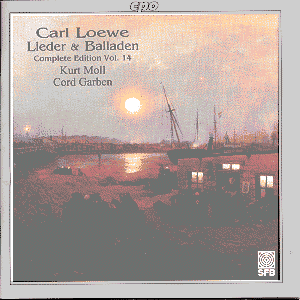Carl LOEWE (1796-1869)
Lieder, volume 14:
Der Wirtin Oöchterlein, Opus 1 No. 2
Die verfallene Mühle, Opus 109
Mädchen sind wie der Wind, Opus 9 No. 4
Der Heilige Franziskus, Opus 75 No. 3
Der Schatzgräber, Opus 59 No. 3
Die wandelnde Glocke, Opus 20 No. 3
Der getreue Eckart, Opus 44 No. 2
Die Glocken zu Speyer, Opus 67 No. 2
Der Mänch zu Pisa, Opus 114
Der alte Goethe, Opus 9
Friedericus Rex, Opus 61
Das Erkennen, Opus 65 No. 2
Abschied, Opus 3 No. 1
Melek am Quell, Opus 10 No. 6
Der Edelfalk, Opus 68 No. 2
Langraf Philipp, Ops 125 No. 1
Das Grab zu Ephesus, Opus 75 No. 1
Harald, Opus 45 No. 1
 Kurt Moll (bass) Kurt Moll (bass)
Cord Garben (piano)
Rec 8-10 March 1996 1998, SFB Berlin
 CPO 999 414-2 [69.58] CPO 999 414-2 [69.58] |
 |
| Crotchet
AmazonUK
AmazonUS
Amazon
recommendations |
Loewe is an important figure in the German song (lieder) repertory. Practically
an exact contemporary of Schubert (he was born the previous year), we tend
to think of him as a composer of the next generation, because he lived a
normal life span, until 1869.
Loewe wrote in excess of 500 lieder, as well as all manner of instrumental
and choral music, though it is for his solo vocal works that he is remembered.
The fact that this CPO issue of collected songs is labelled 'Volume 14' tells
its own tale.
The artists are certainly of the front rank, both having established their
credentials across Europe and beyond, and in a wide range of repertoire.
For example, Moll is an established artist in the world's major opera houses,
and Garben is a noted conductor as well as a talented pianist. Their experience
and artistry is always evident in these performances, which are thoroughly
convincing and imaginatively projected.
Perhaps the most distinctive of all the performances in this generous collection
is that of the early ballad Der Wirtin Töchterlein, from his
Opus 1 of 1818 (published five years later). Based on an original folksong,
about an inn-keeper who tried to marry off his dead daughter, it is performed
with the utmost involvement. On the other hand, the later Die verfallene
Mühle (The derelict mill - 1847) is altogether more atmospheric
and sophisticated in style, immediately impressing Loewe's range upon the
listener.
And so it continues. Song after song reveal a master of his craft, in
performances which carry the utmost conviction. Anyone who has enjoyed the
songs of, say, Schubert and Schumann should investigate this music.
The CPO recording is nicely unobtrusive, with a naturally ambient acoustic
and a good balance between voice and piano. Kurt Moll is in particularly
fine voice too, tempting me to think that his greatest strength lies in the
field of lieder singing.
There is a generous booklet with detailed introductory notes and full texts
and translations, making this a highly attractive issue for the specialist
and non-specialist alike.
Terry Barfoot

